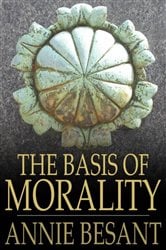
The Basis of Morality | Free Book

Must religion and morals go together? Can one be taught without the other? It is a practical question for educationists, but apart from education, the question of the bedrock on which morals rest, the foundation on which a moral edifice can be built that will stand secure against the storms of life - that is a question of perennial interest, and it must be answered by each of us, if we would have a test of Right and Wrong, would know why Right is Right, why Wrong is Wrong.
Mysticism cannot be spoken of as a basis of morality in the sense in which Revelation, Intuition, Utility and Evolution are bases, for it is valid only for the individual, not for everybody, for the true Mystic, the dictates of the Outer or Inner God are imperial, compelling, but to any one else they are entirely unauthoritative. None the less, as the influence of the Mystic is wide-reaching, and his dicta are accepted by many as a trustworthy revelation - are not all revelations communicated by Mystics? - or as the intuition of an illuminated conscience, or as showing the highest utility, or as the result of an evolution higher than the normal, it is worth while to consider their value.
The true Mystic, realising God, has no need of any Scriptures, for he has touched the source whence all Scriptures flow. An "enlightened" Brahmana, says Shri Krshna, has no more need of the Vedas, than a man needs a tank in a place which is overflowing with water. The value of cisterns, of reservoirs, is past, when a man is seated beside an ever-flowing spring. As Dean Inge has pointed out, Mysticism is the most scientific form of religion, for it bases itself, as does all science, on experience and experiment - experiment being only a specialised form of experience, devised either to discover or to verify.
These Mystics are a law unto themselves, for the inner law has replaced the external compulsion. More rigid, for it is the law of their own nature; more compelling, for it is the Voice of the divine Will; more exacting, for no pity, no pardon, is known to it; more all-embracing, for it sees the part only in the whole.
But it has, it ought to have, no authority outside the Mystic himself. It may persuade, it may win, it may inspire, but it may not claim obedience as of right. For the Voice of the God within only becomes authoritative for another when the God within that other self answers the Mystic's appeal, and he recognises an ideal that he could not have formulated, unaided, for himself. The Mystic may shine as a Light, but a man must see with his own eyes, and there lies the world's safety; the materialised Mystic, strong as he is, cannot, by virtue of the God within him, enslave his fellow-men.
Also read:
- Title: The Basis of Morality | Free Book
- Author: Steven
- Created at : 2025-01-04 16:12:45
- Updated at : 2025-01-06 16:23:06
- Link: https://novels-ebooks.techidaily.com/435855-9781775568582-the-basis-of-morality/
- License: This work is licensed under CC BY-NC-SA 4.0.
